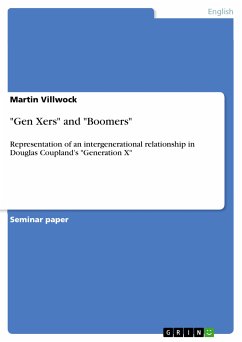Seminar paper from the year 2004 in the subject English Language and Literature Studies - Literature, grade: 1,7, University of Cologne (Englisches Seminar), course: Seminar, language: English, abstract: Every individual has a conception of his or her relationship to his parents. Correspondingly, most societies have an understanding of the different generations that live within them, and of the relationship that exists between these generations. In the early 1990s however, the character of the generation born during the 60s and 70s, thus mostly being in their twenties, “[remained], to many, an enigma” (Holtz, 1). There seemed to be no way of identifying them as a group, no obvious ideas, political interests or music they shared. (George, 24-26 and Holtz, 3) This explains, to some extend, the name and the success of Douglas Coupland’s book Generation X; a book that was dubbed “most shoplifted book in America” (Rogers, 1). The publishers sensed that there might be a common interest in an identification of the young generation; consequently, the cover text of the original edition read: “Finally [my emphasis] … a frighteningly hilarious, voraciously readable salute to [this generation] – a camera shy, suspiciously hushed generation known vaguely up to now [my emphasis] as twentysomething.” The media happily accepted this input and put their focus on the characteristics they thought to be fabulously pointed out in the book; for example the contempt towards the older generation. This escalated and soon developed into sort of a small inter-generational war in magazines, books, newspapers and movies (Porsche, 10-11). Is this what Coupland tried to achieve? Was it his intention to create new front lines? The main question is how is the “Boomer” – “Gen Xer” relationship displayed in Generation X? In this paper, an attempt will be made to point out the popular conception of this relationship in the 90s, and to find out how it is actually represented in this book.
Bitte wählen Sie Ihr Anliegen aus.
Rechnungen
Retourenschein anfordern
Bestellstatus
Storno









